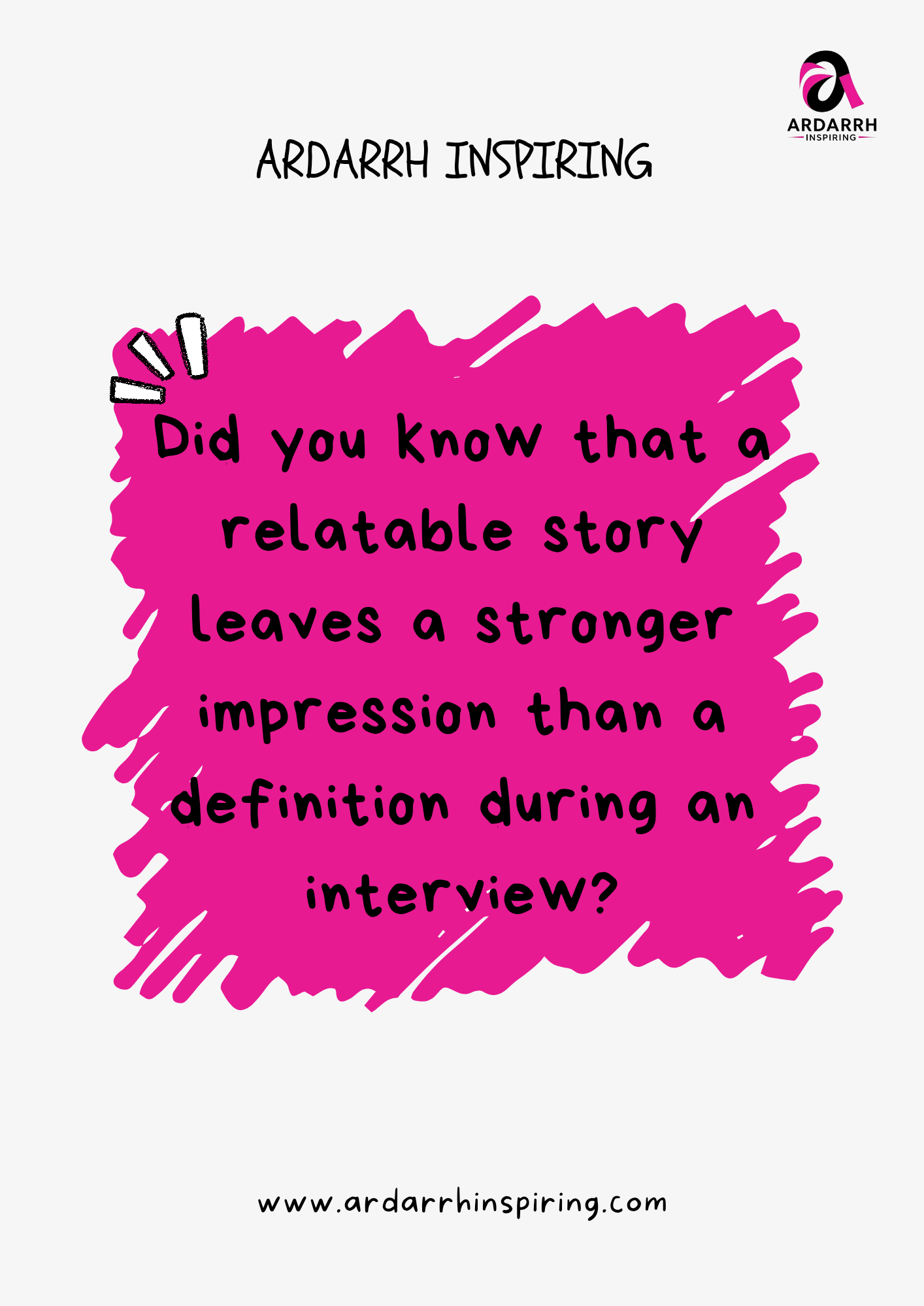Why Storytelling Beats Definitions in Interviews — And How to Make Yours Count
Have you ever walked out of an interview knowing you had all the qualifications, yet still feeling like something didn’t land? You answered every question correctly. You spoke about your skills, your degree, your work ethic. But somehow… it didn’t stick.
Here’s the truth I’ve learned — both from my own experience and from the stories of others like me:
It’s not about saying the “right” thing. It’s about saying the “real” thing.
And real stories?
They’re unforgettable.
The Power of Stories in Interviews
Let me tell you what most people do during interviews.
They say things like:
- “I’m a team player.”
- “I’m detail-oriented.”
- “I work well under pressure.”
And while all these qualities are great, they’re overused, over-rehearsed, and honestly… forgettable. Why? Because they’re just words. Words that don’t connect.
Now imagine instead of saying “I’m a team player,” you told the story of that time you stayed late to help your colleague finish a pitch deck that saved your client relationship.
Or when you worked across time zones to complete a website redesign in 48 hours.
That’s the magic.
That’s the moment the interviewer leans in and thinks, “Now that’s someone I want on my team.”
My First Wake-Up Call
When I first moved to the UK, I thought having a Master’s degree and solid freelance experience was enough. I polished my CV, practiced definitions of “strengths” and “competencies,” and walked confidently into interviews.
But time and again, I noticed the same thing:
Someone else would get the job — someone with less paper qualification, but more story.
I once sat in a waiting room with another candidate who said something that stayed with me:
“If they ask what you do under pressure, don’t define pressure. Describe a day it almost broke you — and how you got back up.”
That day, I stopped reciting memorized answers.
I started sharing real stories.
Why Stories Work
There’s a science to it too. Our brains are wired to respond to narratives, not facts. Stories activate empathy, imagination, and trust.
In a crowded job market — especially if you’re an international student or creative freelancer trying to get sponsorship — your story becomes your brand.
It’s not about being dramatic. It’s about being specific, human, and authentic.
How to Craft a Winning Interview Story (The STAR Method)
If you’ve never heard of the STAR method, let me break it down simply:
- S – Situation: Where were you? What was going on?
- T – Task: What were you responsible for?
- A – Action: What steps did you take?
- R – Result: What happened in the end?
Let’s turn a boring answer into a story using this.
Question:
“Tell me about a time you worked under pressure.”
Generic Answer:
“I work well under pressure and I always meet deadlines.”
Story Answer (STAR):
“Last year, I was managing a digital campaign for a client who changed the brief 48 hours before launch (S). I was in charge of redesigning all social media graphics, updating the website banners, and coordinating with the ad team (T). I immediately created a new workflow in Trello, split tasks with my junior designer, and stayed up that night to finish mockups (A). The campaign launched on time — and the client later referred two more businesses to us (R).”
Which one are you more likely to remember?
But I Don’t Have Big Experiences…
Listen, you don’t need to have worked at Google or saved a company from collapse to tell a good story.
Here are everyday stories that matter:
- Volunteering at a local charity and learning how to deal with difficult people.
- Working two part-time jobs while studying, and how you managed your time.
- Designing your own portfolio website from scratch and teaching yourself new tools.
Every job, project, or challenge carries a story — if you reflect deeply enough.
And if you’re in the creative space like me, your story is more than your skillset. It’s your process. Your grit. Your comeback. Your values.
What to Do Before Your Next Interview
- Write down 5 real experiences where you solved a problem, helped a team, or overcame a challenge.
- Use the STAR method to turn each into a story.
- Practice saying them out loud until they sound natural like you’re talking to a friend.
- Match them to common interview questions like:
- Tell me about yourself.
- Describe a challenge you overcame.
- What’s your greatest strength?
Bonus Tip: Add a lesson at the end of each story. That’s what makes it inspiring.
“That experience taught me to always listen before I speak.”
“It reminded me that creativity doesn’t come from comfort zones.”
Your Story Is the Gift You Bring
The most important thing I want you to know is this:
You don’t need to sound perfect. You need to sound real.
That’s what gets remembered. That’s what builds connection.
That’s what gets you hired — or at least noticed.
So, whether you’re a fellow international student, a Nigerian creative trying to secure sponsorship, or a freelance writer like me navigating remote opportunities… please, stop hiding behind big words.
Tell your truth.
Tell your process.
Tell your story.
Ready to Turn Your CV Into Storytelling Gold?
If you’re struggling to figure out how to present your experiences in a relatable, professional way — I help creatives and job seekers craft CVs and cover letters that speak like humans, not robots.
📩 Send a message or email me at hello@ardarrhinspiring.com
🌍 Let’s make your next interview unforgettable — not because you had all the answers, but because you shared your journey.








